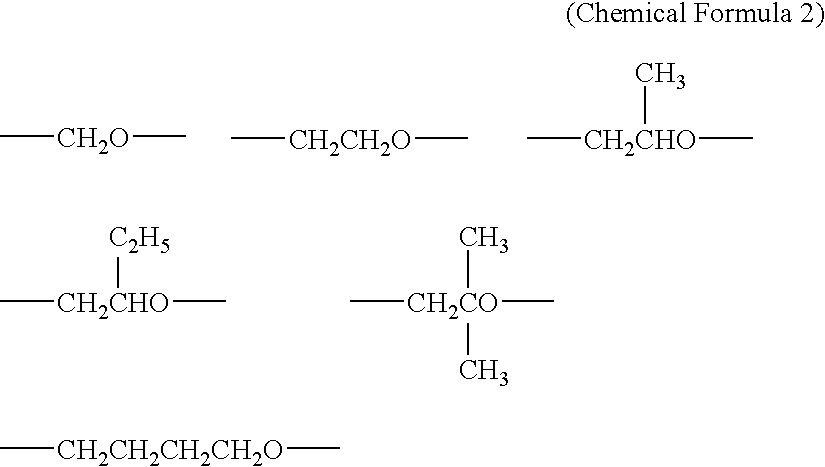Curable composition and sealing method for ceramic siding boards
a technology of composition and sealing method, applied in the direction of liquid surface applicators, coatings, coverings/linings, etc., can solve the problems of insufficient elongation at break, and high elongation at break, so as to achieve the same plasticizing efficiency, excellent elongation properties, and satisfactory workability
- Summary
- Abstract
- Description
- Claims
- Application Information
AI Technical Summary
Benefits of technology
Problems solved by technology
Method used
Image
Examples
synthesis example 1
[0129] Into 50 g of toluene heated at 105° C., a mixed solution of 14.5 g of methyl methacrylate, 68.5 g of butyl acrylate, 15 g of stearyl methacrylate, 2 g of γ-methacryloxypropylmethyldimethoxysilane, 0.5 g of 2,2′-azobis(2-methylbutyronitrile), and 20 g of toluene was dripped for over 5 hours. “Postpolymerization” was then performed for 1 hour to produce a vinyl copolymer.
synthesis example 2
[0130] A heat-resistant glass reactor equipped with an agitator was charged with 500 g of linear, allyl group-terminated polypropylene oxide having a backbone chain prepared using a double metal cyanide complex catalyst and having a number-average molecular weight of 20,000, and 10 g of hexane, and azeotropic dehydration was carried out at 90° C. After hexane was distilled off under reduced pressure, the reactor was nitrogen-purged, and 20 μl of chloroplatinic acid catalyst (5% by weight isopropanol solution in terms of platinum) was added thereto. While stirring, 4.6 g of dimethoxymethylsilane (DMS) was slowly added dropwise to the mixture. The mixed solution was subjected to reaction for 2 hours at 90° C., and unreacted DMS was distilled off under reduced pressure. A silylated polymer was thereby produced.
synthesis example 3
[0131] As in Synthesis Example 2, linear, dimethoxymethylsilyl group-terminated polypropylene oxide having a backbone chain prepared using a double metal cyanide complex catalyst and having a number-average molecular weight of 10,000 was produced.
PUM
| Property | Measurement | Unit |
|---|---|---|
| diameter | aaaaa | aaaaa |
| particle size | aaaaa | aaaaa |
| elongation at break | aaaaa | aaaaa |
Abstract
Description
Claims
Application Information
 Login to View More
Login to View More - R&D
- Intellectual Property
- Life Sciences
- Materials
- Tech Scout
- Unparalleled Data Quality
- Higher Quality Content
- 60% Fewer Hallucinations
Browse by: Latest US Patents, China's latest patents, Technical Efficacy Thesaurus, Application Domain, Technology Topic, Popular Technical Reports.
© 2025 PatSnap. All rights reserved.Legal|Privacy policy|Modern Slavery Act Transparency Statement|Sitemap|About US| Contact US: help@patsnap.com



